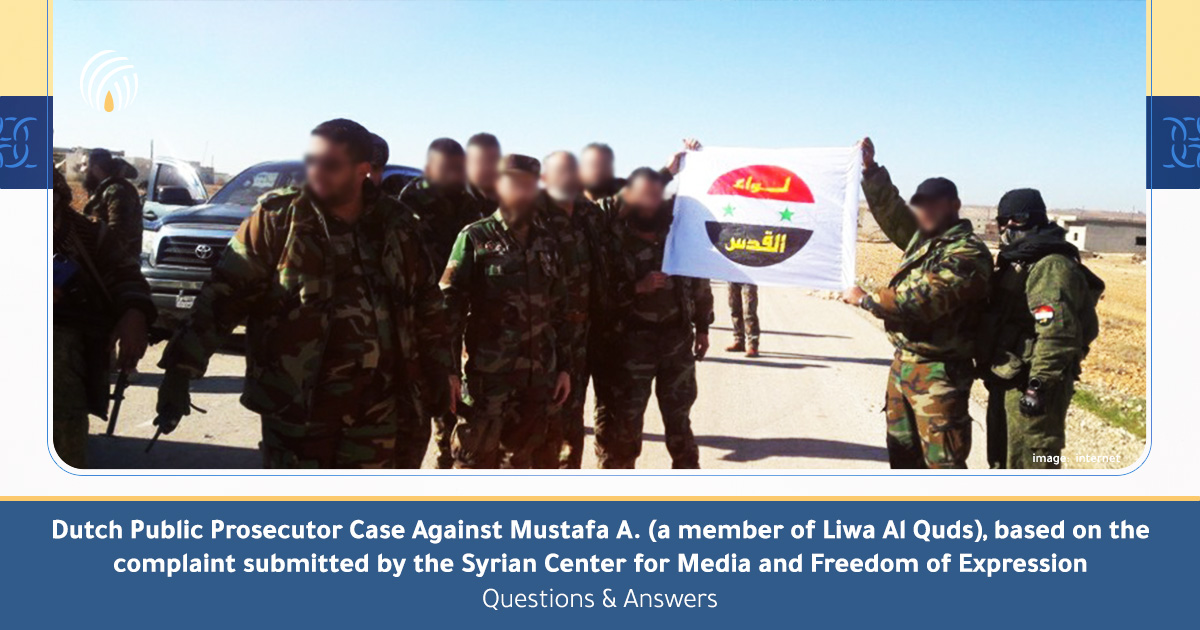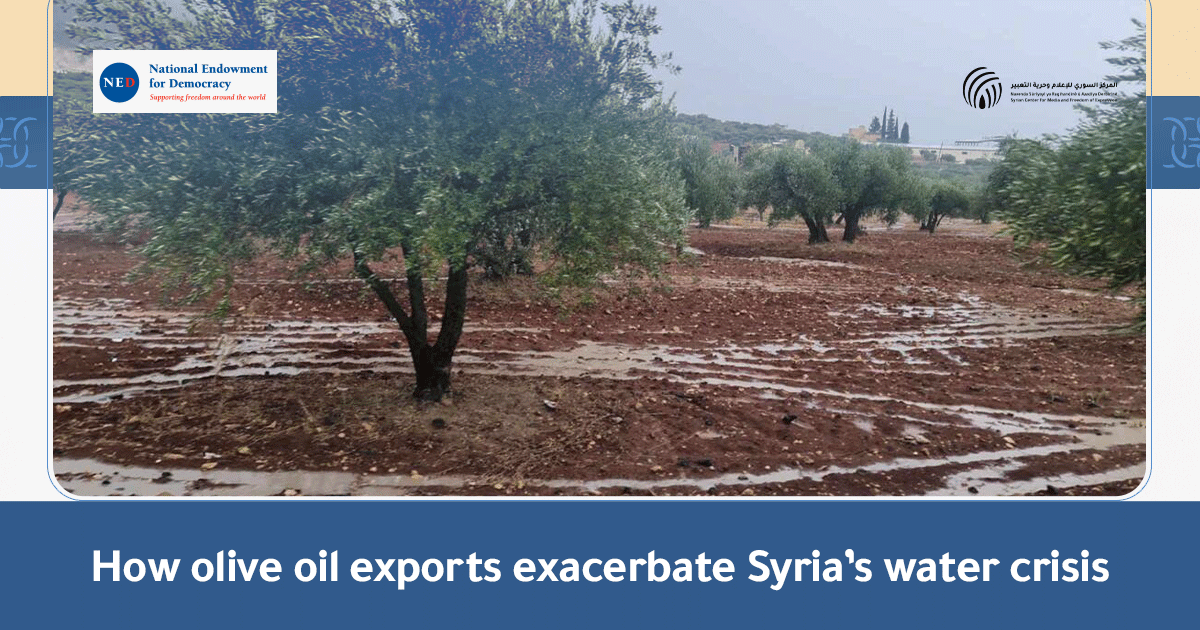Who is the accused?
The 35-year-old accused is a Syrian-Palestinian national and was a member of Liwa Al Quds. He was arrested in the Dutch city of Kerkrade in May 2022.
What are the charges?
He is accused of against humanity and war crimes, as well as participating in Liwa al Quds militia activities, in which he is accused of having been involved in at least two violent arrests of civilians in January 2013. According to the Dutch Public Prosecutor (DPP), the accused was involved in abusing the civilians during the arrests and carries criminal responsibility for the victims having been tortured in detention centers where they were transferred after their arrest.
What is Liwa al Quds?
Liwa al Quds (aka Jerusalem Brigade) is a militia that was formed as a pro-regime militia force in the Aleppo region, comprised of Palestinian refugees. The militia reportedly was supported and armed by the Syrian regime, at the beginning of 2013. As part of this case, the DPP alleges that Liwa al Quds formed a key part in the regime’s widespread and systematic attack on the civilian population that took place in the context of the regime’s violent response to the 2011 Syrian revolution. Reportedly, the militia took part in crushing civilian demonstrations and violently arresting civilians. Consequently, the DPP is making the case that Liwa al Quds should be qualified as a criminal organization whose purpose it is to commit international crimes–a new legal definition in the Dutch Code on International Crimes.
What is the legal basis for a trial in the Netherlands on crimes committed in Syria?
The Dutch Code on International Crimes contains a soft version of the principle of universal jurisdiction. This means that under certain conditions Dutch police and DPP can investigate and prosecute, and Dutch courts can hear cases regarding the most severe atrocity crimes. These include war crimes, crimes against humanity, and genocide–no matter who committed them, where they were committed, or who they were committed against. Behind this principle lies the idea that these crimes are so outrageously inhumane that they do not only affect single individuals and societies, but the international community as a whole. This principle is especially valuable in situations like Syria, where proper and fair trials are impossible in the country itself and international attempts at achieving justice, for example at the International Criminal Court, have been politically blocked. In this case, the court has jurisdiction because the accused had been living in the Netherlands since 2020 and was thus present on Dutch territory when the authorities started their investigation.
What is the importance of the case?
This case is groundbreaking in a number of ways. First, it is yet another example of the central role that civil society organizations, especially Syrian groups, have been playing in chasing justice and accountability for Syria. Without information and tips from them, cases like this one might not be possible.
Second, this is the first time that a member of an organization linked to the Assad regime will face accusations in a Dutch court. There have been indications for some time, and worries from the Syrian community in the Netherlands, that Syrian asylum seekers in the Netherlands may include individuals who were part of feared pro-Assad militias in Syria, including members of Liwa al Quds and other so-called “shabiha”.
Third and directly related, this case may set an important legal precedent for more cases, as it is the first time the Dutch prosecutor has alleged “participation in an organization that aims at committing international crimes” in relation to Liwa al Quds, a newly defined crime in the Dutch Code on International Crimes. As such, this case is especially significant because it could set a precedent for possible future cases against Assad’s allies in the Netherlands, should the court decide that Liwa al Quds is a criminal organization.
Fourth, the accusations against the suspect do not only focus on individual war crime charges but also include the charge of crimes against humanity. To prove this charge the DPP will have to present evidence regarding the overall picture of the structural and widespread crimes committed by the Syrian regime, in the context of which the individual accusations took place. As such, the trial and the court’s decision will contain more than just information on a single case but contribute to a larger collection and legal analysis of information as part of a broader effort on the national, regional, or international level.
What has the investigation looked like?
In 2020, the Strategic Litigation team at the Syrian Center for Media and Freedom of Expression (SCM) shared information with the Dutch war crimes unit regarding the allegations against the then-suspect. The Dutch authorities located and arrested him in May 2022. He has been in pre-trial detention since. Every 90 days pre-trial hearings took place during which the court decided each time that the pre-trial detention could be prolonged for the police to complete its investigation under the guidance of the DPP. During this time, the police heard additional witnesses and completed the investigation steps. The defense attorney also exercised the right to hear additional witnesses. All of the evidence and information gathered during this pre-trial phase make up the case file that the DPP presents to the court at the end of the investigation in preparation for the trial hearing in court.
When does the case go to trial?
The trial hearing will start on 30 November 2023 and will likely only take a day or two.
What will the trial look like?
During this hearing, the court will review the case file presented to the judges by the DPP and will ask questions that arise from that review. The judges will give the victim, who with our support was able to join the case as an official party to the proceedings, the time and space to address them, state his formal case for damages and, more importantly, recount his experience and express his views on the case and its larger context. It is unusual for the court to hear additional witnesses during this trial stage, as they will normally all have been heard in the pre-trial phase. The court usually renders its judgment two weeks after the trial ends. In complex cases, the court may request for more time to deliver its decision.
Why can’t the case be brought before the International Criminal Court (ICC)?
Because Syria is not an ICC state party, the ICC will not have jurisdiction over crimes committed in Syria, except through a referral from the UN Security Council. However, the Security Council has been blocked by vetoes from China and Russia, preventing the ICC or a special tribunal for Syria from investigating or being established. This is why the use of universal jurisdiction to trigger cases in national courts has been such a central feature in the work of NGOs like The Nuhanovic Foundation(NF) and its Syrian partners.
What role does the Syrian Center for Media and Freedom of Expression (SCM) play in the case?
The Strategic Litigation team at SCM began investigations into the suspect’s file in June 2020 after it learned that the suspect had arrived in the Netherlands. This preliminary information, including from witnesses and victims, indicated that he may have committed grave crimes against Syrians and Palestinians. SCM’s own investigation later came to the conclusion that the suspect committed a number of violations, which according to SCM’s analysis should be considered war crimes and crimes against humanity. SCM also shared with the Dutch authorities information from its Violations Documentation Center (VDC) database regarding violations committed by the Liwa al-Quds militia.
SCM, in cooperation with NF, also introduced the case to the public and interested Syrians and Palestinians and focused on their involvement and knowledge of the details of the case, and their follow-up of the course of the trial.
What role does The Nuhanovic Foundation play in the case?
The Nuhanovic Foundation works with and supports survivors of human rights violations and international crimes who seek reparations through legal proceedings in the Netherlands, including criminal cases.
NF works with a network of partner lawyers specialized in supporting witnesses and victims of grave crimes to claim their procedural rights, prepare them for and accompany them during their part in the legal process, and make them as comfortable as possible in what often is an emotionally distressing experience.
When trials take place in legal contexts far away from and largely foreign to those affected by the cases, it is imperative that witness and victim participation is made a reality. Through NF’s work, they ensure that the voices of victims and witnesses are heard in these legal proceedings and that they have a sense of ownership of the proceedings.
In this case, NF cooperated with SCM to support witnesses and a direct victim of the alleged crimes through enabling legal and logistical aid. Next to monitoring the case, they also spread awareness of the case through advocacy activities and shaped public debate by mobilizing academics and journalists. Through these activities, The Nuhanovic Foundation aims to contribute to the framing of such national cases in the larger international context in which these kinds of atrocious crimes take place.
How can you attend the trial hearing on 30 November?
The trial hearing will take place on Thursday, 30 November 2023, at the Hague District Court at Prins Clauslaan 60, 2595 AJ Den Haag. Monday, 4 December 2023, is scheduled for a possible extra trial hearing day should this be needed.
The hearing will start at 9:00 hrs sharp. It is advisable to arrive at least half an hour in advance. Visitors will have to present a valid ID to be admitted to the court. Access to the simultaneous court translation from Dutch into Arabic and vice versa will be available.
Alternatively, you may request a web link for a live stream of the trial hearing from the court. This live stream will not be publicly available, but strictly only upon request from the court. If you are interested in following the trial online please send an email to [email protected] as soon as possible.





